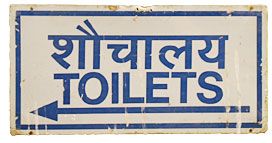 Diarrhoea is commonly caused by a bowel infection due to a virus, bacteria or parasite. Increased exposure to gastroenteritis-causing factors is why diarrhoea is so common amongst travellers; in fact up to five million Brits suffer from it every year.
Diarrhoea is commonly caused by a bowel infection due to a virus, bacteria or parasite. Increased exposure to gastroenteritis-causing factors is why diarrhoea is so common amongst travellers; in fact up to five million Brits suffer from it every year.
It normally begins during the first week after arriving in a new place; trying new foods exposes us to new bacteria that our bodies are not used to. It also puts us at risk of dangerous bacteria such as salmonella and E. Coli, as well as parasites like Giardia and viruses like the norovirus. All of these are transmitted through hand to mouth contact, and eating or drinking contaminated food or water. Diarrhoea can also be caused by eating different foods with higher levels of spice or oil than our normal diet.
If all this has put you off eating or drinking anything in a new country (or even travelling at all!), try to keep in mind that there are things you can do to decrease the severity and length of a diarrhoea episode abroad.
Use common sense to prevent diarrhoea
Avoiding diarrhoea in the first place means taking the appropriate precautions with food and water. Of utmost importance is washing your hands after using the toilet, before handling food and before eating. Keep hand wipes and/or sanitising gel with you at all times in case handwashing facilities are not readily available.
You will want to learn about proper water protocol, including:
- Only drinking water if you are certain it is clean (bottled water)
- Boiling, chemically purifying or filtering any water that may be unsafe
- Drinking only pasteurised milk
- Beer, wine, tea and coffee are generally safe
- Apply water purity standards to ice cubes and the water you use to clean your teeth
When it comes to food:
- Try to avoid food stalls that look dirty
- Make sure the dishes, cups and utensils you use are clean
- Pay attention to temperature- food that is meant to be hot should be steaming hot; if it is meant to be cold it should be cold and/or kept in proper refrigeration
- Do not eat food that has been exposed to flies or other insects
- Do not eat food that has been sitting out or exposed to air (avoid leftovers)
- Avoid green salads as the lettuce can easily be contaminated by insects or soil
- Eat vegetables that have been thoroughly cooked
- Peel all fruit before eating (including tomatoes and apples)
- Follow local advice about eating seafood as some can be unsafe at certain times of year
Minimise the effects of travellers’ diarrhoea
Despite your best efforts, travellers’ diarrhoea can still catch up with you. Besides, you won’t want to spend your trip obsessing over what to eat and where! Part of travelling is experiencing new flavours and textures and you needn’t let fears of becoming ill spoil all the fun.
Although most cases of travellers’ diarrhoea clear up in less than five days (with plenty of rehydration), some people cannot risk missing so much of their trip. Diarrhoea can also progress to including blood or mucous in the stool. If it is accompanied by severe dehydration, bleeding, fever, pain or incessant vomiting, medical assistance is required.
It is possible to arm yourself with antibiotic diarrhoea treatment so that you can respond to it if necessary. Self-treatment may be appropriate for:
- Travellers who plan to visit remote areas that are far from medical help
- Travellers on business whose work would be affected by a bout of diarrhoea
- People on very short trips
- Those with bowel conditions such as irritable bowel syndrome*
- Travellers who have medical conditions that may be exacerbated by infection or dehydration*
- People who have a history of suffering with severe travellers’ diarrhoea
*Note that anyone with a bowel condition or other serious medical condition should seek medical help if they have severe diarrhoea.
Standby treatment: what to take
Taken when the travel diarrhoea sets in, an anti-sickness treatment such as Avomine will alleviate symptoms and help you avoid becoming dehydrated.
Diarrhoea can also be treated with a short course of antibiotic (azithromycin), coupled with the anti-diarrhoeal Loperamide.
You can create a small diarrhoea treatment kit to be used if necessary, containing Avomine, Loperamide and a course azithromycin antibiotic. If diarrhoea strikes, start with Avomine or Loperamide and move on to antibiotics if necessary.
It is also important to remember that the real danger with diarrhoea is becoming dehydrated. If you get diarrhoea you should continue to drink three to four litres of fluid (anything except milk) per day; specialised rehydration fluids are best.
Also read information on travelling abroad with prescription medicine.



